Firefighters Hold Protest In Tehran Demanding Higher Pay
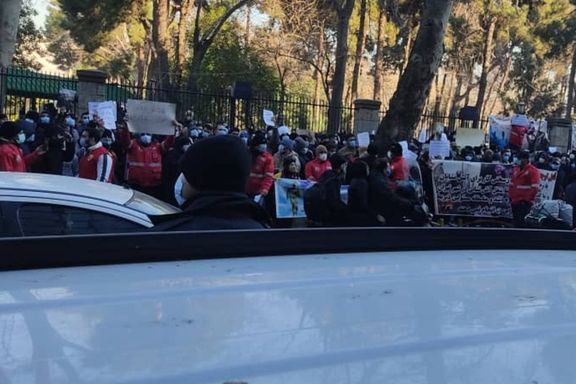
Hundreds of firefighters have held a demonstration in Tehran to protest their low salaries and poor living conditions amid high inflation and rising prices.

Hundreds of firefighters have held a demonstration in Tehran to protest their low salaries and poor living conditions amid high inflation and rising prices.
Firefighters gathered in front of Tehran city hall on Wednesday in protest to the indifference of authorities to their problems.
They also urged the resignation of Tehran’s Fire Department chief and vowed to continue similar rallies until their demands are met.
Last week, thousands of teachers held their fourth round of nationwide protests in more than 50 Iranian cities to demand better salaries and the release of their colleagues detained in earlier demonstrations.
Authorities, who have shown little interest in raising salaries, arrested Mohammad Taghi Fallahi, the head of Iran’s teachers’ union to serve his six-month sentence for organizing the protests.
Workers and employees from various economic sectors are holding regular protest rallies or strikes to demand better work conditions and salaries.
Last week, hundreds of staff members from Iran’s hardliner judiciary department took to the streets in several cities, in what was an unprecedented development.
Food prices have risen by more than 60 percent in recent months, on top of high inflation in the previous three years. Government figures show that prices for 83 percent of basic food staples have reached a critical level. People living on salaries have cut back on nutritious food, such as meat, fruits and dairy products.
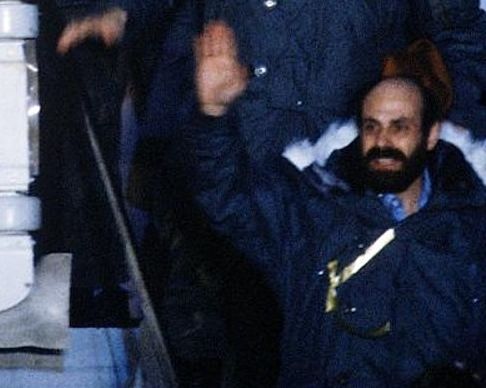
Barry Rosen, a survivor of the Iran Hostage Crisis, has started a hunger strike in Vienna where diplomats from Iran and world powers are negotiating to salvage the 2015 nuclear deal.
Rosen, who arrived in Vienna on Wednesday, says he will hold his protestfor the freedom of the dozens of hostages held unjustly by the Iranian regime, asking the world to “prioritize their release”. He spend 444 days in captivity in the US embassy in Tehran from November 1878 to January 1980.
Rosen has expressed hope his move can stop other countries from reaching a deal with Iran until the hostages are released.
Another journalist and rights activist Jamshid Barzegar says he’s going to join Rosen’s sit-in in Vienna to draw attention to hostages and all political prisoners held by Tehran.
Barzegar said in a tweet that he is joining the hunger strike also to protest the Islamic Republic's “murder of poet Baktash Abtin,”who died of Covid-19 complications following days of medically induced coma after he was denied timely treatment by officials at Tehran’s notorious Evin prison.
The poet and writer was sentenced to six years in prison in May 2019 for his writings.
Since the 1979 revolution the Islamic Republic has arrested and jailed many foreigners on vague and trumped-up charges to use them as bargaining chips against Western countries.
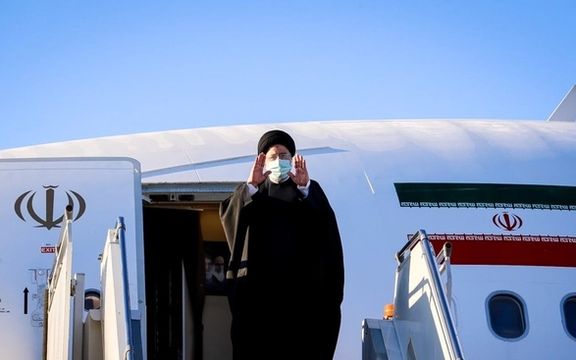
Iranian President Ebrahim Raisi has arrived in Russia for a two-day state visit upon an official invitation by President Vladimir Putin.
Before leaving Tehran for Moscow Wednesday morning, Raisi expressed hope that his visit could be a “turning point” in bilateral relations.
“Undoubtedly, we have good relations with all of our neighbors, particularly Russia, and considering the bilateral political, economic, and trade relations, this trip can be a turning point in our cooperation with Russia,” he said.
“The Iran-Russia collaboration in the region certainly creates security and will prevent unilateralism,” the Iranian president said.
Raisi is scheduled to hold a meeting with President Putin and deliver a speech at a plenary session of the Duma, the lower house of the Russian parliament during his trip.
Rejecting speculations that Raisi is going to Russia to ink the proposed 20-year agreement, Iran’s ambassador to Russia Kazem Jalali has said the two presidents may discuss and agree on different issues but signing deals is not on the agenda of the visit.
On Tuesday, the Russian Pacific Fleet announced it will take part in joint naval war games with Iran and China in without announcing the exact date and location for the drills.
Earlier in the week, Iran’s former ambassador to Russia said increasing banking cooperation between Tehran and Moscow can be used to circumvent United States’ sanctions.
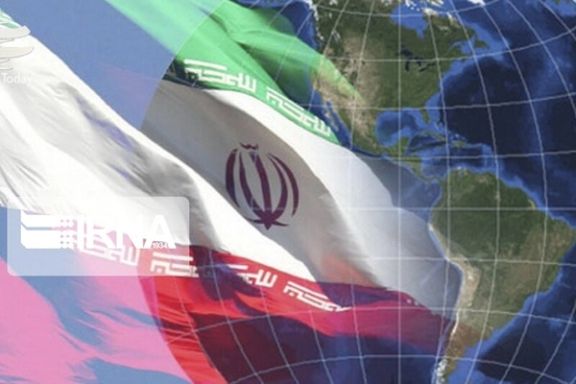
Hardliner officials and media in Tehran say a new power triangle consisting of Iran, Russia and China has formed against the United States in the world.
"In the new world order, a triangle consisting of three powers – Iran, Russia, and China – has formed in Asia. This new arrangement heralds the end of the inequitable hegemony of the United States and the West," Mahmoud Abbaszadeh-Meshkini, spokesman of the National Security and Foreign Policy Committee of the Iranian parliament, said Wednesday.
In his interview with the government news agency IRNA, published as President Ebrahim Raisi was preparing to leave Tehran for an official visit to Moscow, Abbaszadeh-Meshkini also claimed that the Raisi administration has succeeded in turning Tehran into "the center of political and diplomatic consultations and arrangements in the region, Asia, and the world."
Khamenei's advisor Ali-Akbar Velayati also claimed in a recent interview that Iran has turned into a world power equal to Russia and China.
Raisi's visit to Moscow is taking place in an atmosphere of heightened public debateover Iran's now official policy of aligning with Russia and China against the West despite the once promoted "Neither East, Nor West" slogan of the founder of the Islamic Republic, Ayatollah Ruhollah Khomeini. The slogan has been inscribed over the entrance of the foreign ministry building in central Tehran.
Hardliners claim that closer economic and political relations with the East and Asian countries, which Iran's Supreme Leader Ali Khamenei has promulgated with the catchphrase "Looking East", will help Iran's development and strengthen it against Western powers, particularly the United States. Since 2018, and Khamenei's advocation of the policy, "Looking East" has become one of the centerpieces of a 'revolutionary economy' which hardliners have been hard at work to theorize and promote.
Hardliners accuse the former moderate president, Hassan Rouhani, and his reformist allies of sacrificing the potentials of expansion of relations with the East, Russia in particular, during the eight years of his presidency in favor of relations with Europe and the US.
In a note entitled "Expansion of Foundations of National Interests" Wednesday, Javan newspaper which is affiliated to the Revolutionary Guards (IRGC) alleged that Rouhani knowingly sabotaged relations with Moscow, cold-shouldered some of Putin's initiatives, and that his government never acted on the 15 cooperation agreements signed during his visit to Moscow in 2017.
"[President] Ebrahim Raisi's visit to Russia … can once again draw Tehran-Moscow relations out of a state of suspension and endow it with a strategic quality," Javan said of the importance of Raisi's visit.
Insisting that the Pentagon and liberals at home are worried about the visit, Javan added that "political conjunction with Russia and China" will elevate relations with the two Eastern powers from "seasonal and occasional" to a strategic level. "These developments in the Tehran-Beijing-Moscow axis will fundamentally change security arrangements in the region," Javan wrote.
In another article Wednesday, Javan said important economic agreements over a bilateral monetary arrangement to eliminate the need for going through the international banking system would be discussed with Russian officials.
Javan claimed that Raisi's visit, a few days after Foreign Minister Hossein Amir-Abdollahian's visit to Beijing, has born "tangible results in economic, political and social arenas" in the past few months and predicted that stronger relations with Russia will bear significant results in the process of the Vienna nuclear talks to restore the 2015 nuclear agreement with world powers and in neutralizing US sanctions.
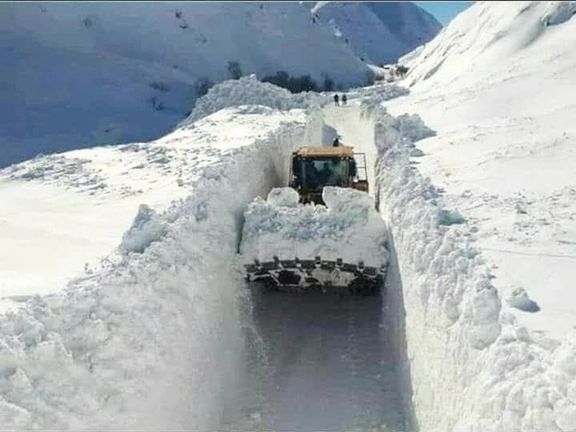
Heavy rain and snow after months of drought have led to floods across Iran in the past week, causing deaths and damage to thousands of properties and roads.
According to reports, the southern regions of the country -- in Sistan-Baluchistan, Kerman, Fars and Hormozgan provinces -- are the worst hit by heavy rains, with higher number of casualties and villages that are left without power and surrounded with water.
Heavy snow, unprecedented in recent years, have chocked off mountain passes. Some areas are blanketed with six feet of snow.
Local authorities said on Wednesday that four people, including three children, were killed in floods in Kerman and Hormozgan provinces, dozens of villages were evacuated and access to more than 300 other villages was cut off.
There is no exact number for the casualties as many people are still missing and communication systems are lost in many of the flood-stricken areas, while relief operations are slow and insufficient. ()
Kerman Governor Ali Zeinivand said at a meeting of the province's crisis management taskforce on Wednesday that the situation in many towns and villages was critical as they are besieged by water, and unless precipitation decreases, flooding cannot be controlled.
Officials from different ministries and organizations, including President Ebrahim Raisi and several military commanders, have been paying visits to the people who are living in temporary housings.
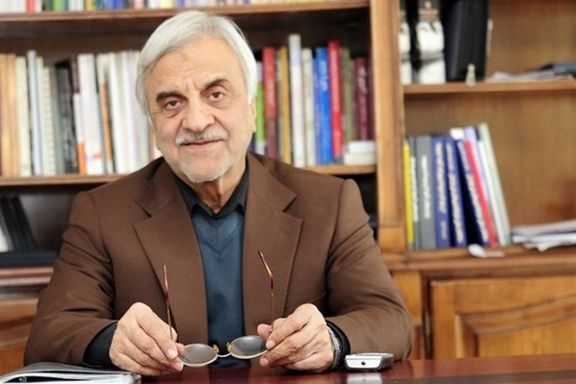
Reformist politician and former presidential candidate Mostafa Hashemi-Taba says rising hardships in Iran might lead to mass protests and even ethnic conflicts.
Hashemi-Taba told Aftab News in Tehran that increasing economic pressure on people has led to social abnormalities and Iranians are feeling that authorities are not responsive to their demands. This can lead to a new wave of protests, he warned.
Hashemi-Taba said that there has been a lot of pressure on the Iranian middle class during the past few years and some sociologists even say that the middle class has been eliminated. As a result, the remaining affluent class have are facing the poor and this can have dangerous consequences.
"The problem is not simply one of class differences. The problem is that people are frustrated and there is no bright prospect for the future. When people are poor and frustrated at the same time, this means that they have nothing to lose," Hashemi-Taba said.
He said one of these consequences is migration from the villages to the marginal areas of large cities. He added that the problem will not be solved by distributing small handouts. "Giving away bread coupons will not solve the problem” he said.
He highlighted protests by workers from various sectors of the economy and asked how long people can remain patient. He also criticized officials who ignore the volatile situation and make statements to please top leaders, adding insult to injury.
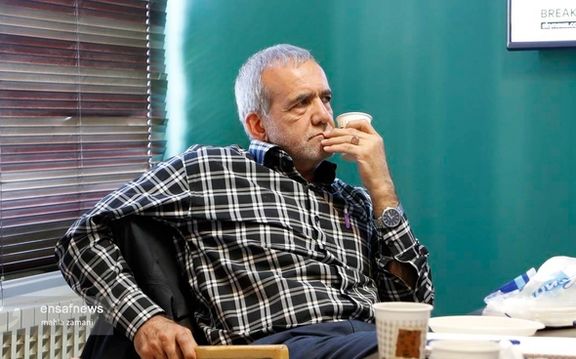
Meanwhile, reformist lawmaker Massoud Pezeshkian has told Ensaf New, a media outlet he owns, that Iran's current situation is similar to the former Soviet Union and the Eastern bloc in the final years before the collapse of Communism.
He said there are many lessons for decision-makers in Iran such as the collapse of Communist governments in East Germany, Hungary, Czechoslovakia, Rumania and Bulgaria. There are many lessons in the history of that period for "the dictators, totalitarian rulers and those who are sure of themselves and think they are the only ones who know the truth."
The lawmaker made the comments after the picture of a book about the fall of the Soviet Union on his desk at parliament became controversial. The book was Revolution 1989, The Fall of the Soviet Empire (Victor Sebestyen). He also quoted the Koran as advising the people to go around the world and see what became of those who oppressed the people.
Pezeshkian said, he reads that book when he does not need to participate in parliamentary discussions, adding that he has also read other books during session, including Why Nations Fail (D. Asemoglu and J. A. Robinson) and the Narrow Road to Freedom (Michael Leitman) as well as religious books.
Pezeshkian said Eastern bloc countries failed because of the wrong behavior of totalitarian their totalitarian leaders. When rulers create dictatorships, societies tend to become chaotic. In such a situation, as soon as the government is weakened the society will rise and this leads to chaos and massacre, he argued.
Since 2018 Iranian cities have experienced major protests and the government's crackdown on protests led to hundreds of deaths as security forces fired military weapons into the crowds and often shot people to death at point blank range. During the latest protests in Iran in November, security forces used shotguns against farmers protesting the government's mismanagement of water resources, often shooting them in the face. During protests since 2017, “Death To the Dictator” has been a recurrent slogan by angry demonstrators.